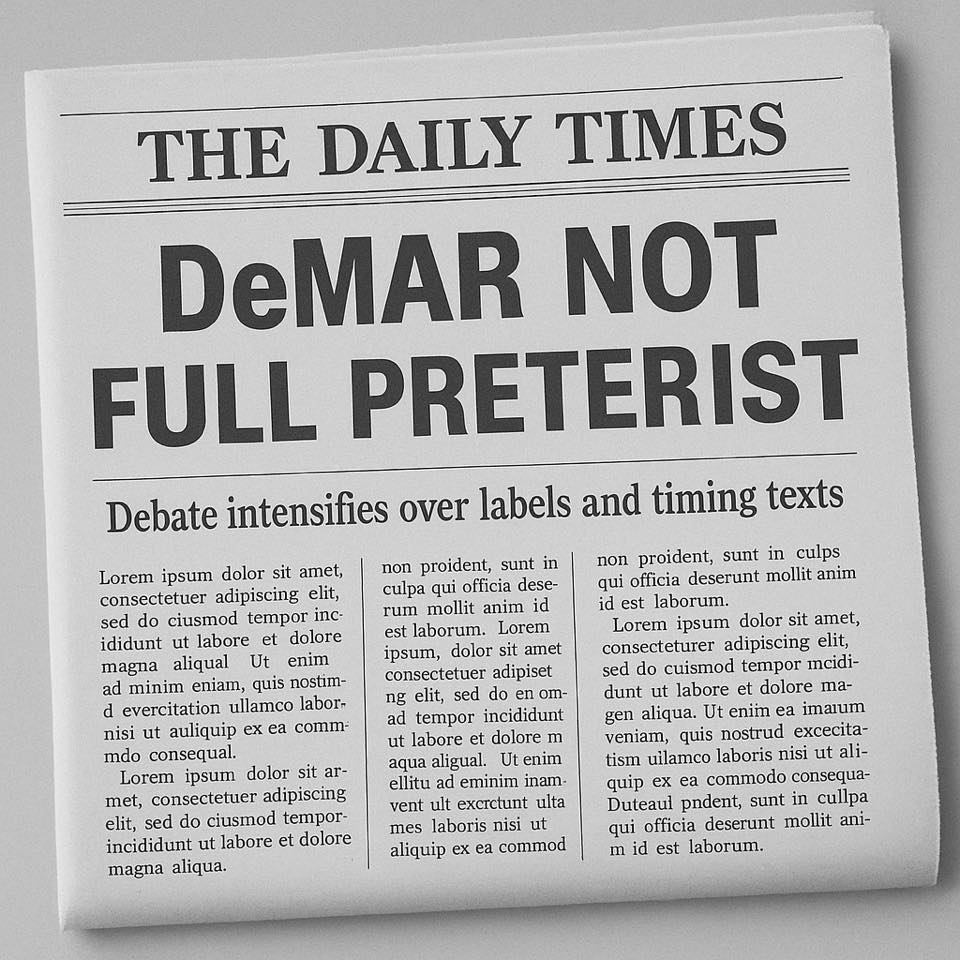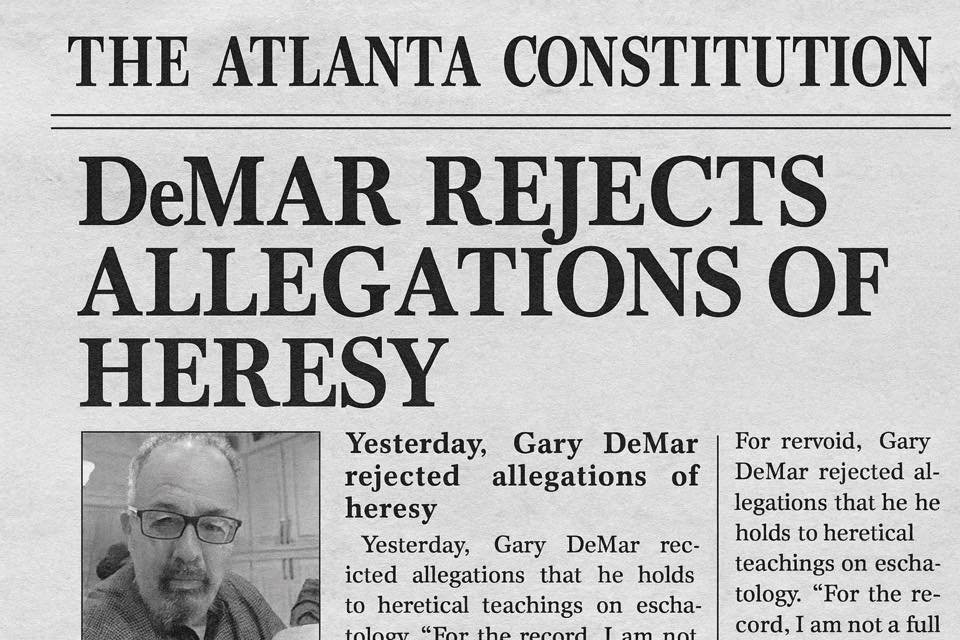|
This Page is dedicated to the Great Gary DeMar Controversy of 2023
New to the Controversy? Start with this introductory treatment and explanation:
The Gary DeMar Controversy & How Doug Wilson and Canon Press Teach Covenant Creation -- The Quiet Part
December 24, 2023
By Tim Martin
Preparation for DeMar/Wilson "Debate and Dialogue" on November 3, 2025
October 20, 2025
by Tim Martin
How Preterism Makes Blamo Creation Go Kaboom!! The Dispensational Problem for the DeMar-Wilson Event
October 26, 2025
By Tim Martin
Is Doug Wilson a Partial Preterist? Watch for this KEY Detail in the Upcoming DeMar-Wilson Event!
October 30, 2025
By Tim Martin
Preterism, Justification and Fulfilled Salvation: The DeMar-Wilson Event Goes SEMPER REFORMANDA!
November 15, 2025
By Tim Martin
Levirite Marriage and the Age to Come: Doug Wilson's Dilemma in the DeMar/Wilson Debate
November 25, 2025
By Tim Martin
Gary DeMar v. Doug Wilson Eschatology "Debate and Discussion" on November 3, 2025
Full Footage and Recording from Moscow, Idaho
Rental Bodies in the November Rain: Complete Review and Analysis of the DeMar-Wilson Event
by Tim Martin
November ?, 2025

Gary DeMar Interviewed on CrossPolitic:
The Controversy Roars to New Life in August, 2025!
Zach Davis Responds to the Crosspolitic Interview:
"Gary DeMar and CROSSPOLITIC Discuss the Resurrection"
Douglas Wilson Responds to the Crosspolitic Interview:
"Throwing Out the Nicene Creed?"
(Print Version Here - "Presupp and Preterism")
Josh Gipson Responds to Douglas Wilson:
"A Roman Raft in Reformed Waters"
"DeMar and Church Authority" article by Deacon Jonah
Gary DeMar Responds to the Crosspolitic Interview:
"Still Looking for that 'Slam Dunk' Verse"
Jeff Durbin Responds to the Crosspolitic Interview
Zach Davis Responds to Jeff Durbin's Claims
Zach Davis Talks about Josh Gipson's Response:
"Josh Gipson Responds to Doug Wilson on Presup"
Mike Sullivan and Don Preston Respond to the CrossPolitic Interview
Doug Wilson: "Full Preterism and the Death Problem"
(Print Version Here: Full Preterism and the Death Problem")
Zach Davis Responds to Doug Wilson on Biological Death
Update (2024) The Gary DeMar Controversy: Canon Press, Preterism and Genesis Creation
Evaluation and Excerpts from Gary DeMar and Kim Burgess' Volume 2 of The Hope of Israel and the Nations - 2024

Tim Martin Unpacks the 2023 Gary DeMar Controversy on Youtube -- Christmas 2023
Tim Martin Reviews Gary DeMar and Kim Burgess' New Book: The Hope of Israel and the Nations: Redemption Accomplished and Applied Volume 1 on YouTube
Tim Martin (Part 2) Reviews Gary DeMar and Kim Burgess' New Book: The Hope of Israel and the Nations: Redemption Accomplished and Applied Volume 2 on YouTube
Excerpts from Prophecy Wars: The Biblical Battle Over End Times
G. Ward Fenley Interviews Douglas Wilson on Preterism
March , 2023 --The Conflict Erupts:
The Original "3 Questions" Letter
(Monty Python Style)
Gary DeMar Counters:
"We are back! Continuing our discussion with Kim Burgess on Covenant Eschatology..."
-Gary DeMar, Part 10 titled The Fullness of Israel, minute 00:25
Followup by Gary DeMar and Darren Doane (Aug 2, 2024):
What the Heck Happend in 2023?
John Lightfoot on 'The New Heavens and New Earth' by Gary DeMar (April 20, 2023)
What Gary DeMar Believed and Argued 25 Years Ago (March 14, 2023)
Gary DeMar's Heretical Eschatology by P. Andrew Sandlin (March 16, 2023)
Theological Jenga & Full Preterism (March 13, 2023)
Douglas Wilson Retreats from Eschatology into Protology (July 17, 2023)
"What this amounts to is that hyper-preterism is not simply an eschatological error. It is also a significant cosmological error. The question about the end of the world cannot be separated from the question of the shape of the world and the arc of world history." Douglas Wilson
"Doug Wilson's Old Jeans" Response by Travis Drum (July 23, 2023)
"Like a Pair of Old Jeans - Psalms 102" Response by Sullivan/Preston (July 29, 2023)
Tim Martin Challenges Kim Burgess to Formal Debate!
"Preterist Objections -- Christ's Physical Visible Return" by Travis Drum
"The Magnitude of Gary DeMar’s Denial of a Bodily Resurrection" By Pastor John M. Otis
"Gary DeMar is Lying" By Jason Bradfield
Has Gary DeMar Denied the Christian Faith?
(Editor's Note: Please check back when this podcast series is complete for further analysis and in depth comment.)
"If dissent against any proposition in a confessional statement destroys the dissenter's good standing in the church, then the confession becomes irreformable, unamendable, and, for all practical purposes, canonical. And when the confession becomes canonical, the authority of the Bible is threatened, not protected."
- John Frame
Miscellaneous Related Material
(Editor's Note: Jeff Durbin references Isaiah 51 in this sermon. We would invite the reader to examine this better understanding from Jerel Kratt in footnote #7 in this scholarly presentation on 2 Peter 3 where Jerel writes:
Typically preterists in general make this argument from Isaiah 51:16. It isn’t the purpose of this paper to analyze every angle, but I’d like to briefly state that Isaiah 51:16 is not discussing Sinai but rather the future new heavens and earth to be established in AD70 as seen later in chapter 65. The entire context of Isaiah 51 is looking forward to the consummation in AD 70 (particularly vs. 3-8, and vs. 14).
Also relevant to this point is that the Septuagint (LXX) uses the future tense nearly throughout verse 16: “I will put my words in your mouth. And under the shadow of my hand I will shelter you, in which I established the heaven, and founded the earth. And he shall say to Zion, You are my people”. I would argue that even the past tense “established” is a future prophetic past tense – “in” those things which God would do for Israel through the Messiah (put his word and law in their mouth and shelter them) is how the heavens and earth would be “established”.
The Hebrew text (MT, Westminster Leningrad Codex) also has the future tense in the same places as the LXX, yet nearly all translations make it past tense. How might such a change in tenses affect the reader? Instead of looking forward to a new heavens and earth, which is the context of Isaiah 51, some erroneously look backwards and “create” a heavens and earth at Sinai when nowhere else in the Hebrew scriptures is such a concept presented, including the Law, where one would expect to find “heavens and earth” used to describe the creation event of the people of Israel. Granted, several places in the OT call Israel “heavens and earth”, but no such creation event exists using that language other than Genesis 1:1. Could it not be that “heavens and earth” simply mean “God’s people in covenant relationship”, and always have?)
(Editor's Note: Mike Sullivan references Isaiah 51 early in this video. We would invite the reader to examine this better understanding from Jerel Kratt in footnote #7 in this scholarly presentation on 2 Peter 3 where Jerel writes:
Typically preterists in general make this argument from Isaiah 51:16. It isn’t the purpose of this paper to analyze every angle, but I’d like to briefly state that Isaiah 51:16 is not discussing Sinai but rather the future new heavens and earth to be established in AD70 as seen later in chapter 65. The entire context of Isaiah 51 is looking forward to the consummation in AD 70 (particularly vs. 3-8, and vs. 14).
Also relevant to this point is that the Septuagint (LXX) uses the future tense nearly throughout verse 16: “I will put my words in your mouth. And under the shadow of my hand I will shelter you, in which I established the heaven, and founded the earth. And he shall say to Zion, You are my people”. I would argue that even the past tense “established” is a future prophetic past tense – “in” those things which God would do for Israel through the Messiah (put his word and law in their mouth and shelter them) is how the heavens and earth would be “established”.
The Hebrew text (MT, Westminster Leningrad Codex) also has the future tense in the same places as the LXX, yet nearly all translations make it past tense. How might such a change in tenses affect the reader? Instead of looking forward to a new heavens and earth, which is the context of Isaiah 51, some erroneously look backwards and “create” a heavens and earth at Sinai when nowhere else in the Hebrew scriptures is such a concept presented, including the Law, where one would expect to find “heavens and earth” used to describe the creation event of the people of Israel. Granted, several places in the OT call Israel “heavens and earth”, but no such creation event exists using that language other than Genesis 1:1. Could it not be that “heavens and earth” simply mean “God’s people in covenant relationship”, and always have?)
"In order for the new heavens and new earth to be established, the old order must first pass away. Two questions immediately present themselves. What is meant by the phrase "heavens and earth"? When will (or did) the transition take place?
With regard to the first question, we must immediately rule out a reference to the physical cosmos..." (p. 27)
"So then, the heavens and earth are a figure for the kingdoms of heaven and earth. The new heavens and the new earth are a figure for the glorious and ever-increasing reign of our Lord Jesus Christ." "Biblical Pictures of the New Cosmos" by Douglas Wilson, p. 27, 29.
And It Came To Pass, published by Canon Press, 1993
"Theologians sometimes use 'Old Covenant' to refer to the Mosaic covenant. There is truth to this in that the Mosaic covenant published most fully the distinctive character of the Adamic covenant under curse. Yet, ultimately, the Old Covenant is the covenant of the original garden of Eden. Ultimately there are two covenants, Old and New. There are two Adams, Adam and Jesus. There are two heavens and earth, the first in Adam and the second in Christ."
James B. Jordan, Through New Eyes (1988), p. 311.
Covenant Reformed Baptist Seminary
"The Problem with Preterism"
By Sam Waldron
March 26, 2021
....
"One other piece of background to my discussion of preterism is this. What I have called “orthodox preterism” has an evil twin which I will call Hyper-preterism. The difference between the two views is important. Orthodox preterism believes that many or most prophecies were fulfilled in the past by the events surrounding the destruction of Jerusalem. Hyper-preterism believes that they all were. Thus, the Second Coming of Christ and the resurrection of the dead took place in A. D. 70. Hyper-preterism is, in my view, straightforwardly heretical. I do not use the word lightly!...
Here, then, is the problem with orthodox preterism. I do not see how orthodox preterism does not become hyper-preterism. There is a hermeneutical slippery slope here. If such language in such passages may refer to the coming of Christ in A. D. 70, what language teaching the Second Coming of Christ in the New Testament cannot (on the basis of the same hermeneutical principles) be explained away? Orthodox preterism is in constant danger of becoming its evil and heretical twin.
Do not misunderstand me. I know orthodox preterists do not come to this hyper-preterist conclusion. I know orthodox preterists do not want to come to this conclusion. I am simply saying that I do not know how orthodox preterists avoid coming to this conclusion. Their hermeneutic logically brings them there—if even against their will..."
back to Related Articles and Recordings

|






